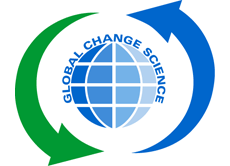
Center for Global Change Science
cgcs@mit.edu
Phone: 617-253-4902
Center Director:
Ronald G. Prinn
Executive Director:
Anne Slinn
 |
MASSACHUSETTS INSTITUTE OF TECHNOLOGY Center for Global Change Science
cgcs@mit.edu
Phone: 617-253-4902
Center Director:
Ronald G. Prinn
|
| | AFFILIATES | RESEARCH | EDUCATION | REPORTS | PERSONNEL | DIRECTORY | JOBS | News/Events | |
|
The MIT Center for Global Change Science (CGCS) addresses fundamental questions about the environment and climate processes with a multidisciplinary approach. The Center's goal is to improve the ability to accurately predict changes in the global environment. The CGCS was founded in January 1990, and in 2006 became an independent center in the School of Science.
The CGCS seeks to better understand the natural mechanisms in ocean, atmosphere and land systems that together control the Earth's climate, and to apply improved knowledge to problems of predicting climate changes. The Center utilizes theory, observations, and numerical models to investigate climate phenomena, the linkages among them, and their potential feedbacks in a changing climate. The Center builds on existing programs of research and education in the Schools of Science and Engineering at MIT. The CGCS is not a degree-granting academic unit. A student enrolled in any department may become involved, which normally occurs through participation in research that is coordinated by a faculty advisor who is affiliated with the CGCS. The interdisciplinary CGCS fosters study of topics as varied as, for example, oceanography, meteorology, hydrology, climate, ecology, biogeochemical cycling, paleoclimatology, applied math, data assimilation, ocean estimation, computer science, and satellite remote sensing. The CGCS sustains a program of basic scientific research on the natural processes controlling global climate, with a concentration on the cycles, circulations and interactions of water, air, energy, and nutrients in the Earth system. The Center's research effort is focused primarily on five fundamental components of the global climate system:
The CGCS also interacts closely with complementary MIT activities in the Earth System Initiative, the Energy Initiative, the Laboratory for Energy and the Environment, and the Earth Resources Laboratory. The MIT Climate Modeling Initiative (CMI) is a cooperative effort of CGCS scientists to develop a state-of-the-art model of the Earth's atmosphere and ocean for study of the climate of Earth. The CMI is utilizing a new generation of climate model that encompasses wide-ranging advances in computation, physical and technological innovations, as well as the latest understanding of climate proceses. The MIT Joint Program on the Science and Policy of Global Change was formed by the CGCS and the MIT Center for Energy and Environmental Policy Research (CEEPR) in 1991. Through this shared endeavor the CGCS nutures significant cross-discipline cooperation to bring enhanced understanding of climate science into the realm of climate policy. The Global Change Joint Program integrates natural and social sciences in research and policy analysis on topics of human-climate interactions and uncertainties about human activities and environmental responses. In tandem these core CGCS activities complement the basic research foci and help to confront the broader challenges of the climate change issue.
|
|
Send comments to
cgcs@mit.edu
MIT Center for Global Change Science, 77 Massachusetts Ave, 54-1312, Cambridge MA 02139 USA | personnel | affiliates | research | education | news | events | reports | directory | jobs | search | contact | |
© 2011 MASSACHUSETTS INSTITUTE OF TECHNOLOGY